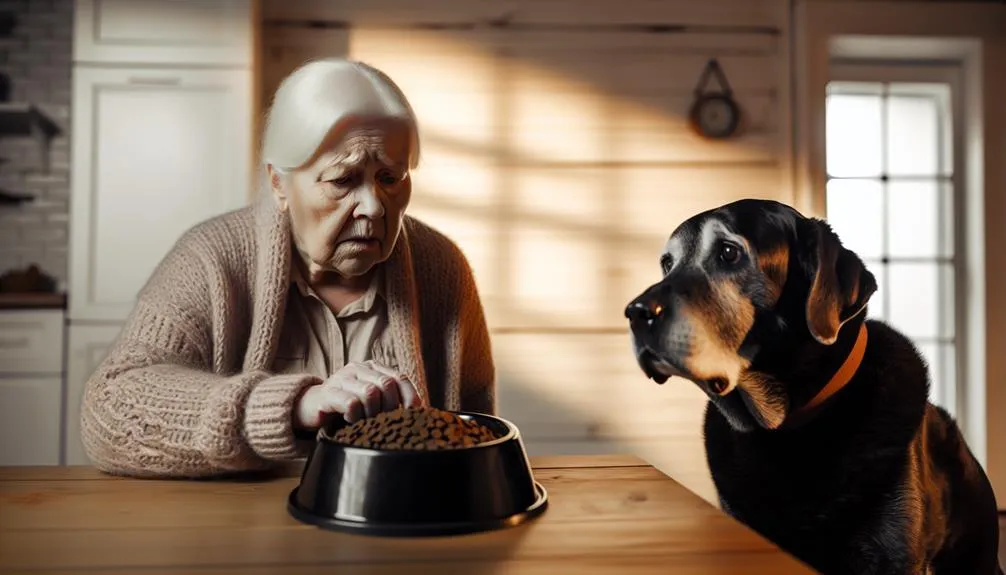
Why Is My Dog Not Eating
If your dog isn't eating, it can be concerning and confusing. You might wonder if it's a health issue, stress-related, or simply a matter of preference. Factors like dental problems, changes in the environment, or even their age can all play a role in their appetite. Observing their behavior closely is essential, but you may find that the reasons behind their refusal are more complex than they seem. Understanding these nuances can lead to better care for your pet, so let's explore what might be going on.
Common Health Issues
When your dog's appetite suddenly dwindles, it can be alarming, and understanding potential health issues is fundamental. Various factors could be at play, and recognizing them is the first step toward ensuring your pet's well-being.
Dental health is often overlooked, yet it can greatly affect your dog's willingness to eat. Pain from dental disease may lead to a reluctance to chew. Similarly, gastrointestinal issues can result in discomfort and nausea, causing your dog to avoid food altogether. Conditions such as infections or parasites can also lead to a loss of appetite.
Infectious diseases, like parvovirus or kennel cough, can quickly escalate and require immediate veterinary attention. Additionally, food Allergies might cause gastrointestinal distress, discouraging your dog from eating. It's vital to observe any accompanying symptoms such as vomiting or diarrhea.
Metabolic disorders, including diabetes or kidney disease, can alter your pet's hunger levels. If your dog is exhibiting pain symptoms, it could indicate underlying issues that need addressing. These concerns can sometimes manifest as behavioral changes, leading to a diminished appetite.
Lastly, consider any recent medication effects. Some drugs may have Side effects that influence your dog's eating habits. If you've recently changed their medication or dosage, consult your veterinarian to discuss any potential links.
Stress and Anxiety Factors
Stress and Anxiety can greatly impact your dog's eating habits, affecting their overall health. Various behavioral triggers, such as changes in routine, loud noises, or the presence of unfamiliar people or pets, can lead to your dog feeling stressed. When under stress, dogs may refuse to eat, leading to potential health complications if not addressed promptly.
Here's a breakdown of common stressors and their effects on your dog's appetite:
| Behavioral Trigger | Potential Impact | Emotional Support Strategies |
|---|---|---|
| Change in Environment | Loss of appetite | Create a safe space for your dog |
| Loud Noises | Anxiety and fear | Use calming aids, like Thundershirts |
| Separation Anxiety | Reluctance to eat | Gradual desensitization to departures |
Recognizing these triggers is vital for providing effective emotional support. By identifying stressors, you can take steps to alleviate your dog's Anxiety. Consider maintaining a consistent routine and providing a calm environment. Additionally, make sure your dog has access to comforting items, such as their favorite toys or blankets.
If your dog's refusal to eat persists, consult your veterinarian. They can help determine if the behavior is linked to stress or if there are underlying health issues. Remember, understanding your dog's emotional state is essential to making sure they feel secure and healthy.
Dietary Changes and Preferences

dietary changes and preferences can greatly influence your dog's willingness to eat. If you've recently switched your dog's food, it might be more than just a simple taste issue. Dogs have specific flavor preferences and can be quite sensitive to changes in food texture. For instance, if your dog was accustomed to soft kibble and you suddenly introduced a crunchier variety, they might reject it outright.
Consider your dog's previous eating habits. If they enjoyed wet food and you're now offering dry, the difference in moisture content could deter them from eating. Additionally, some dogs have distinct flavor profiles they favor—whether it's chicken, beef, or fish. If the new food doesn't align with these preferences, your dog may simply refuse to eat.
It's also important to recognize that sudden changes in diet can lead to gastrointestinal upset. If your dog experiences discomfort after a change, they might associate the new food with that discomfort, further decreasing their willingness to eat. Gradually introducing new foods can be a more effective strategy, allowing your dog to adapt to the new flavors and textures without negative consequences.
Lastly, pay attention to any additional factors that might accompany the dietary changes, such as the food's presentation or even the timing of meals. Each of these aspects can affect your dog's eating behavior. By understanding and catering to your dog's dietary preferences, you can help guarantee they maintain a healthy appetite.
Environmental Influences
Environmental factors can greatly impact your dog's appetite. Changes in surroundings, the introduction of new household members, or even fluctuations in weather and temperature can all create stress or discomfort for your pet. It's important to observe these influences, as they may be contributing to your dog's reluctance to eat.
Changes in Surroundings
Changes in a dog's surroundings can greatly impact its appetite. When your dog experiences a shift in environment, it might feel stressed or anxious, which can lead to a decreased desire to eat. Several factors could contribute to this change in behavior:
- New scents and sounds: Unfamiliar noises or smells can be overwhelming. If you've moved to a new home or had renovations, your dog may take time to adjust.
- Feeding schedule disruptions: If you're away from home or change your daily routine, your dog might not eat at the usual times. A consistent feeding schedule helps provide stability.
- Food storage changes: If you've switched your dog's food storage method or container, the scent or temperature might differ, potentially making the food less appealing.
Understanding these environmental influences is vital. If your dog's appetite doesn't improve after a few days, it is important to consult with a veterinarian. They can help rule out medical issues and provide guidance to ease your dog's adjustment. Paying attention to these factors will help you support your dog's well-being during changes in its surroundings.
New Household Members
How does the addition of new household members affect your dog's eating habits? When you introduce new pets or family members, your dog may experience stress or Anxiety, leading to changes in their feeding routines. Dogs thrive on consistency, and any disruption, even positive ones, can impact their appetite.
If you've welcomed a new pet, your dog might feel threatened or jealous, causing them to lose interest in food. It's important to monitor their behavior closely. Changes in hierarchy within the household can also contribute to this shift. If your dog feels they need to compete for attention or resources, their eating habits may decline.
Additionally, new routines associated with the arrival of family members can confuse your dog. If feeding times change or if they're exposed to different stimuli during meals, this could disrupt their comfort level during mealtime.
To help your dog adjust, maintain their established feeding routines as much as possible. Gradually introducing new members to your dog's space and providing them with a safe, quiet area to eat can also ease the change. Patience and observation are significant in helping your dog adapt to these changes.
Weather and Temperature Effects
When the weather shifts, your dog's eating habits might be affected more than you realize. Dogs often show temperature sensitivity, which can lead to variations in their seasonal appetite. As seasons change, so too might your dog's desire to eat. Here are three ways weather can influence their eating habits:
- Heat: In warmer weather, your dog may feel less inclined to eat. High temperatures can lead to decreased appetite, as dogs may prioritize hydration over food intake.
- Cold: Conversely, colder temperatures can stimulate your dog's appetite. They may require more calories to maintain body heat, prompting them to eat more.
- Humidity: High humidity can also impact your dog's appetite. It can make them feel lethargic or uncomfortable, leading to decreased food consumption.
Understanding these environmental influences can help you identify when changes in your dog's eating habits may be related to the weather. If you notice a significant shift in their appetite, consider how temperature or seasonal changes might be impacting them. Paying attention to these factors can guarantee your dog remains healthy and well-nourished.
Age-Related Considerations

As your dog ages, their nutritional needs and appetite can shift considerably. Puppies may experience fluctuations in their eating habits as they grow, while senior dogs often require adjustments to their diet to maintain health. Understanding these age-related changes is essential to ensuring your dog remains nourished and healthy throughout their life stages.
Puppies and Appetite Changes
Puppies experience significant appetite changes as they grow, and these fluctuations can be concerning for new pet owners. Understanding the factors influencing your puppy's appetite is vital for supporting their growth and health. Here are three key considerations:
- Growth Spurts: During rapid puppy growth phases, you might notice an increase in appetite. This is normal as their bodies require additional nutrients to support development.
- Feeding Schedules: As your puppy matures, you may need to adjust their feeding schedule. Younger puppies typically eat more frequent meals, while older puppies can shift to fewer meals per day.
- Health and Environment: Changes in appetite can also stem from stress, illness, or changes in their environment. Monitoring your puppy's behavior and overall health can help you identify when a visit to the vet might be necessary.
If your puppy suddenly stops eating or shows persistent changes in appetite, it's important to consult your veterinarian. They can help rule out any underlying health issues and provide guidance tailored to your puppy's specific needs. Keeping a close eye on feeding habits will support your puppy's health and development during this vital growth phase.
Senior Dogs and Nutrition
Although senior dogs may still enjoy their meals, age-related changes can greatly impact their nutritional needs and eating habits. As your dog ages, its metabolism slows down, and it may require fewer calories yet more nutrients. It's important to provide high-quality senior dog food tailored to these needs, which often includes increased protein, reduced fat, and added fiber for digestion.
Consider incorporating nutritional supplements to support joint health, cognitive function, and overall well-being. Always consult your veterinarian before introducing any new products.
Here's a quick overview of age-related nutritional considerations:
| Age-Related Change | Recommended Action | Nutritional Focus |
|---|---|---|
| Decreased metabolism | Adjust portion sizes | Moderation in calories |
| Dental issues | Offer softer, easy-to-chew food | Texture modification |
| Joint pain | Add joint supplements (e.g., glucosamine) | Anti-inflammatory options |
Understanding these changes can help you provide the best care for your senior dog. Monitoring their appetite and adjusting their diet accordingly will guarantee they continue to thrive as they age.
When to Consult a Vet
When your dog suddenly stops eating, it can be concerning, and knowing when to consult a vet is vital for their health. Changes in feeding routines can indicate underlying health issues, and it's important to pay attention to your dog's behavioral observations. If your dog hasn't eaten for more than 24 hours, consider the following signs that warrant a veterinary visit:
- Persistent vomiting or diarrhea: If your dog is experiencing ongoing gastrointestinal issues, this could lead to dehydration and other complications.
- Lethargy or weakness: If your dog seems unusually tired, disinterested in activities they normally enjoy, or has difficulty standing, it may signal a more serious condition.
- Additional symptoms: Keep an eye out for other concerning signs, such as coughing, sneezing, or changes in urination. These could point to an illness that requires medical attention.
It's essential to observe any shifts in your dog's behavior or appetite closely. Remember, a temporary loss of appetite may not be alarming; however, if it lasts longer than a day or two, or if you notice any of the signs above, it's best to consult your veterinarian. Timely intervention can make a significant difference in your dog's health and well-being, ensuring they receive the necessary care to get back to their happy, healthy self.
Frequently Asked Questions
Can Weather Changes Affect My Dog's Appetite?
Yes, weather changes can affect your dog's appetite. Temperature sensitivity and seasonal Allergies may lead to discomfort, making them less interested in food. It's important to monitor their behavior and consult a vet if concerns arise.
Do Dogs Eat Less During Certain Seasons?
Yes, dogs can exhibit seasonal appetite changes. Temperature sensitivity influences their eating habits, often leading to decreased food intake during warmer months. It's important to monitor your dog's behavior and adjust their diet accordingly.
Can Boredom Lead to a Loss of Appetite in Dogs?
Yes, boredom can indeed lead to a loss of appetite in dogs. If you notice boredom signs, it might be time to adjust their feeding routine or introduce new activities to stimulate their interest.
Could My Dog's Medications Impact Their Eating Habits?
Yes, your dog's medications could impact their eating habits. Medication Side effects might cause nausea or loss of appetite, and dosage adjustments may be necessary. Always consult your vet to guarantee your pet's well-being.
Are There Specific Dog Breeds More Prone to Eating Issues?
Imagine a garden where certain flowers thrive better than others. Similarly, some dog breeds have genetic factors that contribute to eating tendencies. Understanding these breed tendencies can help you navigate potential eating issues in your pup effectively.
Conclusion
If your dog isn't eating, it's essential to pay attention to potential underlying issues. Notably, studies show that around 20% of dogs experience appetite loss due to stress or Anxiety, highlighting the importance of a stable environment. Keeping an eye on your dog's behavior and dietary habits can help you identify changes early. Remember, if your furry friend refuses food for more than 24 hours, it's best to consult a veterinarian to guarantee their well-being.
You may also like
Archives
Calendar
| M | T | W | T | F | S | S |
|---|---|---|---|---|---|---|
| 1 | 2 | 3 | 4 | 5 | 6 | |
| 7 | 8 | 9 | 10 | 11 | 12 | 13 |
| 14 | 15 | 16 | 17 | 18 | 19 | 20 |
| 21 | 22 | 23 | 24 | 25 | 26 | 27 |
| 28 | 29 | 30 | ||||
Leave a Reply